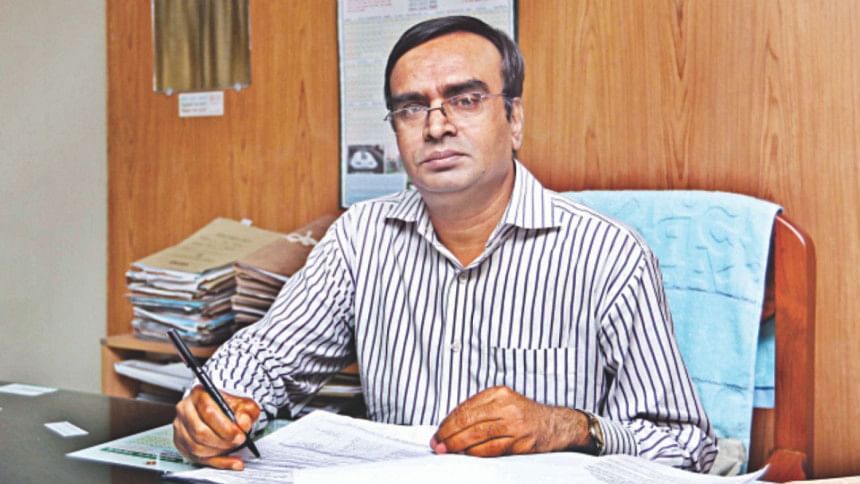Protecting our uniqueness

Why is it so important to do GI registration of our special products? What is the process?
GI registration of a product is new in our country. While some special quality products produced in Bangladesh can be called GI products, there are some specifications that need to be met to fit this criteria. A GI product can include agricultural products, natural products such as Ilish (Hilsa), or handicrafts, such as Jamdani. This special quality product must have an economic value.
A special quality GI product has to be produced in a specific area, meeting the particular soil and climatic condition. The same product can be produced in other areas, but the quality will not be the same. For example, mangoes are grown best in Rajshahi; if the same mango tree is grown in any other area, the mangoes produced there will not have the same sweetness, size or quality. So, a GI product can't be imitated.
In summer, mango sellers from all across the country sell their produce as products of Rajshahi. This happens because there is no way to differentiate the mangoes of Rajshahi from the mangoes of other districts. Through GI registration, we will be able to know that it is a product of a particular area. There will be a label on each mango coming from Rajshahi district. Therefore, both consumers and producers will benefit from it. And our country can get international recognition for this particular product.
An association of producers or a concerned government organisation, which works for safeguarding producers' interests, can apply for GI registration of a product. Before applying, a journal or document should be prepared with historical proof that the product belongs to this place; old newspapers, stories, or a district gazetteer can be used as sources. Based on these documents, a producers' association can apply for GI registration of a product.
An elaborate description of a product, the climatic condition in which it is grown, soil quality, product quality, how it is manufactured, etc., should be mentioned in the journal. A map of the area where this product is produced has to be submitted to us as well. After all this work is done, we will give the association a registered proprietorship and declare its members as authorised users.
The association will then have to fix a logo. There will be a label on each product before they are marketed. If we can ensure proper branding, people will be ready to pay more for these products.
In Bangladesh, the GI Law was passed in 2013 for the registration and protection of our special products. The rules of this law were formulated later and a gazette was published in 2015. We started our work from September 2015.
India has already registered Jamdani, Nakshi Kantha and three varieties of mango (Fazli, Himsagar and Lakkhanbhog) as their GI products, although these were originally produced in our country. How did this happen? Why are we lagging behind India in this respect?
There is no scope for one country to imitate the GI product of another country. Of course, India's products and Bangladesh's products will be of different quality. There will also be labels on the products which will contain its country of origin. For example, mangoes grown in Bangladesh will be labeled as Bangladeshi product, whereas those grown in India will carry their country's name. We have already published a journal to register Jamdani as a GI product of Bangladesh. It's not like an international organisation is responsible for the geographical identification of unique products of individual countries. Each country can register their products following their own laws. India passed the GI Law in 1999 and formulated the rules in 2002. We started working on the law in 2010, and by 2013, we were able to pass the law. We have also formulated the rules within a very short time. I won't say that we are lagging behind.
How does your organisation coordinate with World Intellectual Property Organisation (WIPO)?
WIPO has 188 member countries including Bangladesh. It works for the protection of intellectual property of its member countries. WIPO helps its member countries in formulating laws and rules and provides technical assistance and training. WIPO has several treaties to protect intellectual property. WIPO's member countries can apply for GI in other member countries. For example, if a Bangladeshi product has a large market in China, we can apply for its GI registration in China and it will be registered as a Bangladeshi product.
Have you prepared a list for potential GI products in Bangladesh? How many products have you registered so far?
The Patent, Design, and Trademark Directorate is a regulatory body. But since GI registration is new in Bangladesh, we are providing guidelines to all our stakeholders. But it is the responsibility of producers' associations and other concerned government authorities to identify the GI products of an area. Bangladesh Small and Cottage Industries Corporation (BSCIC) applied for GI registration of Jamdani. It took us six months to get the journal ready. All the groundwork is complete. We will register Jamdani as our GI product in two months. The rule is that two months after the publication of the gazette, a product gets its GI status. The Directorate of Fisheries will apply for GI status of Ilish very soon while the Bangladesh Rice Research Institute (BRRI) has also applied for GI registration of kalo jira rice.

 For all latest news, follow The Daily Star's Google News channel.
For all latest news, follow The Daily Star's Google News channel. 







Comments